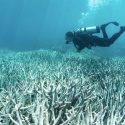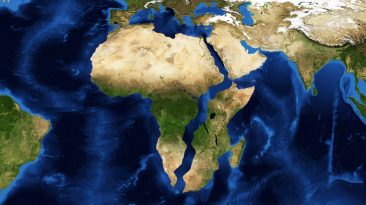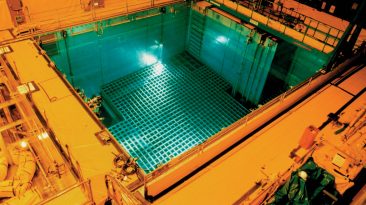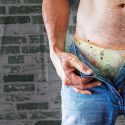Would our life be less comfortable without it? How many animal species could we save by getting rid of plastic debris? Your plastic bag is actually chemically processed natural gas or oil. You can tear it, or burn it, or throw it away when you’re done with it. But it won’t decompose the way this loaf of bread will.

Plastic Facts:
Since the 1950s we’ve created 6.3 billion tons of plastic. 9% of it we’ve recycled, another 12% – incinerated. That leaves us with 4.9 billion tonnes of plastic waste. Plastic accounts for about 10 percent of the total waste we generate. If we could gather it all in one place, this plastic mountain would be bigger than Mount Everest. Plastic accounts for approximately 90 percent of all trash which exists on the ocean’s surface, with about 46,000 pieces of plastic per square mile. 160,000 plastic bags are used around the world every second. 5 trillion plastic bags are created every year. 500 million plastic straws are used in just the United States every year. If plastic production continues at its current rate, plastic pollution will outweigh fish pound for pound by 2050.

Plastic will only start degrading after 700 years and will only fully degrade in 1000 years, meaning that all plastic produced by humans has yet to start degrading. Plastic bags are produced using petroleum, natural gas and other chemicals. Its production is toxic to the environment. In the Los Angeles area, 10 metric tons of plastic are carried into the Pacific Ocean on a daily basis.
A lot of this waste ends up in the sea, killing marine animals who mistake this indigestible synthetic for food. If we eliminated plastics from our lives, we’d save hundreds of marine species from entanglement and plastic ingestion. Plastic can also negatively impact our health – some of the compounds and chemicals found in plastic, such as BPA, have been found to alter hormones or have other potential human health effects. But what about us? What would our routine be like without plastic?
How Much Do We Depend on Plastic, Anyway?
Even if you avoided using plastic containers to bring your lunch to work, or bagged your groceries with reusable shopping bags, you’d still be a far cry from going absolutely plastic-free. Plastic is everywhere.Our dependence on plastic grows worse with every passing year.
Aluminium cans are lined with a plastic resin. Without it, your coke would corrode within three days. Paper cups hide a thin layer of plastic, too. How do you think they keep the liquid inside?
No plastic would also mean no tea bags, since they are heat sealed with polyethylene. Without plastic, grocery shopping would look very different. Our liquids would come in glass bottles. Our meats and cheese would be wrapped in paper. You’d pack all your groceries into paper bags or cardboard boxes.
One of the main benefits of plastic packaging is that it keeps food fresh longer. Without this basic method of food preservation, a lot of our food would need to be raised or grown locally, and much of it would only available seasonally.
Organic waste would fill up the landfills and become our main environmental concern. Our clothing would be limited to natural fibers – no polyester socks, nylon dresses or acrylic sweaters. Say goodbye to your fleece jacket. Heat and water resistant safety wear wouldn’t exist either.
We also use plastics in adhesives for our technology, furniture, and other important items. Plastic is a major part of most cooking utensils. Plastics are also an important part of our medical technologies – Plastics are used to create eyeglasses, prosthetics, in many different medical implants, and other devices which help keep us alive and in good condition.
Computers, Television, Smart Phones, and More:
Without the invention of plastic, you wouldn’t be able to watch this video – without the plastic needed for electrical insulation, there would be no inexpensive circuits to build your phone or computer. Even early electronics in the 1910s used plastic – one of the first plastics – Bakelite. Plastic can be molded into smaller and more particular shapes, as needed by our electronics.
Without any plastic, we’d be stuck in the 1870, still using non-durable and hazardous lacquer and rubber to insulate our wires. All the progress we’ve made in affordable electronics would never have happened. Replacing plastic in our electronics with a different substance is possible, but would be very difficult given the specifications required. Plastic is nonconductive, which is very important for whatever the replacement substance would end up being.
But at least we wouldn’t be polluting the Earth with disposable coffee cups, water bottles, toothbrushes and other plastic stuff. And 700 marine species wouldn’t be affected by plastic debris. If the thought of someone taking your plastic away doesn’t ruin your day, consider moving to Kenya or Bangladesh, where it’s illegal to use plastic bags.
A Sticky (Or Waxy) Alternative:
If you’re looking to cut back on your plastic impact, you might consider getting some of the slimy pets known as wax worms (the lesser wax moth or Achroia grisella and the greater wax moth or Galleria mellonella) a – 6,000 wax worms can eat up a plastic bag in just one hour. You could set up an organic recycling station right in your home. Wax worms are the larvae form of wax moths. Wax moths are actually two closely related species, both of which are commercially bred. Wax worms are also a source of food for many insects and plants, and can be used as an alternative to mammals in different types of scientific research. Two different types of wax worms have been documented consuming and digesting polyethylene and turning it into a biodegradable form.
[expand title=”Sources”]
- The Economist: The known unknowns of plastic pollution
- One Green Planet: 700 Marine Species Might Go Extinct Because of Plastic Pollution
- Baekelite, polyoxybenzylmethylenglycolanhydride
- 8 Sneaky Things You Didn’t Know Are Plastic
- 11 Surprising Items That Contain Plastic
- If plastics had never been invented, would we have enough natural resources (eg. wood, metal, etc) to fill the void from not having plastics?
- What’s the problem with plastic bags?
- 22 Facts About Plastic Pollution (And 10 Things We Can Do About It)
- 10 Shocking Facts About Plastic Pollution
- Living in a Plastic World
- Polyethylene bio-degradation by caterpillars of the wax moth Galleria mellonella
- Could These Tiny Plastic-Eating Caterpillars Hold The Answer To Our Trash Problem?




























superb video